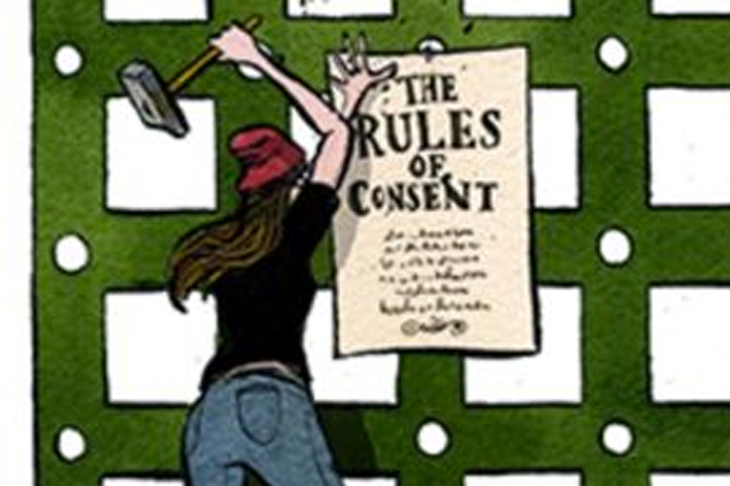There’s an Old Testament story that ought to be better known (who does God’s PR these days?). King David is in his palace, and a servant announces that he has a caller. It’s Nathan the prophet. Good old Nathan — committed to maximizing the life-chances of the poor, a real old-school man of the people, and often a bit spiky with it — a man to keep onside. Yes, yes, send him in. Nathan launches into a story about a humble farmer who has been conned by some smooth-talking landlord and has now lost his land and his last remaining lamb to this greedy sod. The king’s a bit disappointed that Nathan has brought such a tiny issue to his attention — he was hoping for a big juicy cause he could champion, so as to remind the people of his compassionate-conservative credentials. But as Nathan goes into more detail the king becomes genuinely indignant and demands to know who this ruthless landlord is so he can punish him. Oh, I’m talking about you, says Nathan. And he leaves.
The king had assumed that a discussion about morality would remain safely impersonal, that his own misdeeds would not intrude. (If you have forgotten, he had his mistress’s husband killed, by putting him in the front line of a hopeless battle.)
Today’s version of King David is the sort of highly-accomplished liberal who smoothly debates every political issue of the day. I call him (it’s usually a him) the News Bore — he is super-well-informed and probably works in some aspect of the media. He’s ready for whatever issue you throw at him — he will have a thoughtful moral position on it that echoes some of his favorite columnists. But don’t stray from the journalistic realm. Don’t mention his ex-wife, who’s having a hard time, or the fact that his children are selfish misfits. Don’t point out that he has no values beyond bourgeois success, business-class hedonism. That would be impolite.
We’re free to debate the morality of whatever we want in our culture, thank God. So why are our debates so timid, so constrained, so cropped? Unless we’re saying the same old things about the same old topics — race, gender, sexuality — we seem nervous of what might unfold.
By tying morality to topical political issues, we avoid discussing it in ways that might be problematic to us. So we discuss mental health and addiction in terms of pathology. Don’t point out, for example, that addicts tend to be very selfish. Don’t ask why our culture promotes hedonism and excludes voices that question it. If such a voice does, very occasionally, emerge — Jordan Peterson’s for example — critics are ready with buckets of scorn. There is a hunger to unmask such voices as the same old traditional reactionary enemies — this surely comes from a fear that they might be able to challenge us.
Similarly, an online group recently emerged called NoFap, which encourages men to hold back on porn and masturbation. It has attracted widespread suspicion, because its mission risks moving away from abstract impersonal discussion.
The politicization of morality is now most obvious in relation to sex. When the dinner party conversation touches on some aspect of sexual morality, our News Bore has two fail-safe buttons to press. The first is libertarianism. It covers most issues and has entirely solved old chestnuts like ‘public decency’ — the question of what sort of representations of sex should be allowed — for ‘none of us’ wants to bring back censorship. Consequently anything that appears on our screens must just be accepted as part of the way life works these days. To spend any time actually thinking about what should or should not be depicted seems very eccentric, like wanting to know how your car’s engine works.
But these days sexual morality is likely to come up in relation to feminism. Here the dinner party male humbly notes that too many men have held forth on this issue for far too long; he perhaps mentions a feminist writer whose perspective he finds particularly germane. But let’s press him. Forget what feminism says, what do you think about pornography or prostitution or abortion? He wouldn’t know what to say.
The combination of libertarianism and feminism discourages us from thinking about sexual morality. But surely everyone is busily thinking about the question of proper sexual behavior? In Britain the issue currently centers on the behavior of schoolboys after a social media account started posting lurid accusations of improper happenings and sexual violence.
This is a subject worth debating, but the current liberal orthodoxy is very effective at limiting real thought about it. The orthodoxy is that ‘sexual morality’ entirely overlaps with the problem of men abusing women. Sexual morality is therefore a political issue as never before in history. And that means we can keep it at arm’s length. We sign up to the cause, and bat it away.
In response to the crisis of sexual morality in schools, our children’s school sent us a concerned letter including some ‘resources’ that we might to want to show our teenagers. One was a TED talk from last year. It was by a nice English woman called Katie Russell, spokeswoman for a charity called Rape Crisis. We should not be sad about the law’s failure to convict rapists but angry, she told us. OK, but does this somehow relate to my kids?
Then there was another TED talk by a man called Jackson Katz who leadership-trains the US military and college sports teams. He paces around with his head-mike on, tensely announcing that he wants to shift a paradigm, which in TED talks is a sort of ritual invocation to the airy gods of innovation.
‘Gender violence issues have been seen as women’s issues that some good men help with. But I have a problem with that’, says this portly tough guy, who happens to look a bit like Harvey Weinstein. ‘No — these are men’s issues, first and foremost.’ Applause. But not from me. It does not seem very groundbreaking to repeat the feminist perspective in a tough male voice.
The sex-ed that teenagers get from our culture boils down to this: libertarianism within the limits of feminism. Anything goes, except what feminism calls immoral. It’s a flawed creed. Instead of encouraging people to think about the morality of sex, it tells them that the thinking has already been done — the problem has been identified: and it’s male abuse of women and girls. What counts as immoral is obviously for women, the victims, to judge. So, when you include the messages of the wider culture, young men are told that sex is grown-up harmless fun — except for the huge potential harm that your maleness brings to the party. How do they respond? By being careful not to break the rules and offend feminists? What rules, though? Which feminists? Some are offended by the slightest joke. So because sexual morality has been politicized, he can avoid taking it seriously. It is something to negotiate, to get past — very like his mother, whom he must defy to grow up. Boys are taught to be cynical, to pay lip-service to an orthodoxy that they can’t take very seriously. This precisely what is happening with regards to young men and sex today
The new orthodoxy — that sexual morality is a department of feminism — sows resentment. Boys are taught to be guilty: look at the school in Australia which recently forced 12-year-old boys to apologize to the girl pupils for rape culture. What must this do to their minds? They constantly see girls being told that they are brave and autonomous. What must this do to girls? Can it be good for one gender to be told that they are essentially innocent, that the murky side of sex belongs to the other gender? It’s an embarrassingly predictable inversion of the old orthodoxy, the one that blamed female frailty, flirtiness and fickleness for all horrors. Is it beyond us to say that sex is morally problematic for both genders, though in different ways, that we’re all nervous, anxious, vain, greedy; that we’re in this fine mess together? No, but that would mean reviving some troublingly old-fashioned stuff about sexual morality. It’s easier to politicize. Keep that Nathan guy away.

























